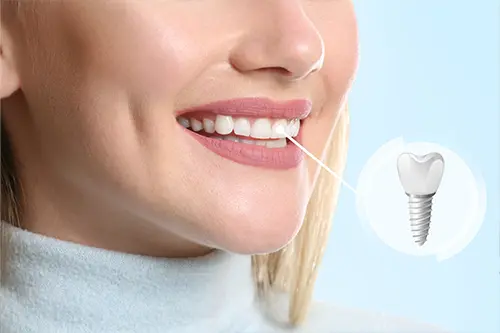Reviewed by Dr. Kerri Font, DDS
Reading time: three minutes

If you have been thinking about replacing missing teeth, you have probably heard that dental implants are one of the best options out there. They look and feel natural, and with the right care, they can last for decades. But not everyone qualifies for implants right away. Your overall health, jawbone strength, and even daily habits all play a role in whether implants are the right choice for you.
Table of Contents
- Who Is a Good Candidate for Dental Implants?
- Who Is Not a Good Candidate for Dental Implants?
- What If You Don’t Qualify Right Now?
- Next Steps Toward Your New Smile
- FAQs
Who Is a Good Candidate for Dental Implants?
Dental implants are ideal for patients seeking a permanent replacement for missing teeth. Before moving forward, your periodontist will evaluate your oral and overall health. Generally, you may be a strong candidate if:
- You have one or more missing teeth and want a stable, long-term replacement
- Your gums are healthy and free of untreated gum disease
- You have enough jawbone density to support an implant post
- You do not smoke or are willing to quit for a period of time before and after surgery
- You are in good overall health without uncontrolled medical conditions (such as diabetes or heart disease)
If you meet these criteria, dental implants may provide a predictable and lasting solution to restore your smile.
Who Is Not a Good Candidate for Dental Implants?
Not all patients are ready for implants right away. Certain factors can delay or prevent treatment. You may not be an ideal candidate if you have:
- Active gum disease or oral infection
- Severe bone loss in the jaw
- Uncontrolled chronic illnesses (such as diabetes, autoimmune disease, or bleeding disorders)
- Lifestyle habits like heavy smoking or excessive alcohol use, which affect healing
- Conditions such as bruxism (teeth grinding) that put too much force on implants
Even if you’re not currently a candidate, many of these issues can be managed with treatment and additional procedures.
What If You Don’t Qualify Right Now?
If your periodontist determines that you are not an immediate candidate for dental implants, it does not mean implants are out of reach. In many cases, the underlying issues can be corrected with focused treatment and preparation.
Treat Gum Disease
Gum disease is one of the most common reasons patients are temporarily not ready for implants. Periodontal therapy, such as scaling and root planing and laser gum therapy, can remove infection and inflammation. These treatments allow your gums to heal and create a healthy foundation for future implant placement.
Rebuild Lost Bone
If bone loss is the issue, bone graft procedures can restore the density needed to support an implant post. Depending on your needs, your periodontist may recommend socket preservation, ridge augmentation, or sinus augmentation to strengthen the jaw and prepare it for implants.
Improve Overall Health
Your overall health plays an important role in implant success. Lifestyle changes such as quitting smoking, controlling diabetes, or improving and maintaining daily oral hygiene can improve healing and reduce the risk of complications after surgery.
Create a Personalized Treatment Plan
Your periodontist will design a custom treatment plan to address any concerns and help you qualify for dental implants. With the right preparation, many patients who do not qualify at first can still become excellent candidates in the future.
Next Steps Toward Your New Smile
If you are considering dental implants, the best first step is a consultation with a periodontist. Contact Highlands Ranch Periodontics & Dental Implants to schedule a dental implant consultation at one of our two Colorado locations:
- Highlands Ranch office: 9090 S Ridgeline Blvd. #225, Highlands Ranch, CO 80129. Call (303) 683-1144 to schedule your visit.
- Sloan’s Lake office: 1525 North Raleigh Street Suite 130, Denver, CO 80204. Call (303) 683-1144 for an appointment.
FAQs
Yes, but smoking slows healing and increases the risk of implant failure—both immediately and years later. Studies show that smokers are about twice as likely to experience implant failure compared to non-smokers. Most periodontists recommend quitting before and after surgery to protect long-term results.
Yes. Age alone does not limit eligibility for dental implants. What matters most is overall health, bone quality, and healthy gums. Many seniors choose implants to restore function and confidence after tooth loss.
With proper care, dental implants can last for decades. Daily brushing and flossing, routine dental visits, and good overall health help maintain their stability and function over time.
Highlands Ranch Periodontics & Dental Implants provides comprehensive implant care at two convenient Colorado locations in Highlands Ranch and Sloan’s Lake. Call (303) 683-1144 to schedule your consultation.
